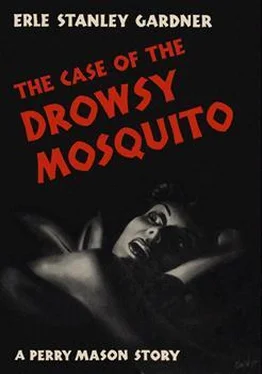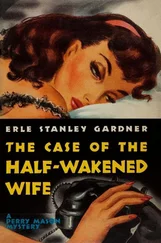For the moment, Greggory was at a loss for words.
Mason went on smoothly enough, “And, frankly, I don’t see any reason why you should adopt this attitude. Ever since January of nineteen forty-two, Hayward Small has been blackmailing Bradisson. Of course, that gives Bradisson a motive to pin the murder on Small; but if you ask me, Sheriff, I think Bradisson is—”
“No one’s asking you,” the sheriff interrupted.
Mason bowed after the manner of one who is rebuked by a person in authority. Thereafter, he became conspicuously silent.
Greggory turned to Hayward Small. “What I’m trying to find out,” he said, “is about that stock.”
Small moistened his lips with his tongue, merely nodded.
“What about it?” Greggory asked.
“All I know is what Dorina told me.”
“Well, what was that?”
Mason said reproachfully, “Hearsay testimony. I wouldn’t repeat it, Small. You can’t vouch for it, you know.”
“You keep out of this,” Greggory shouted.
“After he gets that out of you, he’ll start giving you a third-degree on the murder charge, you know,” Mason observed. “How about a cigarette — anyone want a cigarette?”
He calmly took his cigarette case from his pocket.
“Thank you, I’ll take one,” Della Street said sweetly.
Greggory said angrily, “Get out of here. Clear out!”
“But I thought you wanted me,” Mason said.
“I wanted an explanation of this...”
“Oh, yes. Do you want to go into that again?”
“No, I don’t.”
Hayward Small, who had been doing more thinking, said suddenly, “Look here, I’m going to come clean on this thing. I had absolutely nothing to do with that poisoning. I did — well, I did bring a little pressure to bear on Jim Bradisson about eighteen months ago.”
“January, nineteen forty-two, wasn’t it?” Mason asked.
“That’s right.”
“Very shortly after Mrs. Banning Clarke passed away, I believe.”
Small said nothing.
“And Moffgat began exerting a little pressure at about the same time,” Mason said.
“I’m not interested in any of this,” Greggory announced.
“I am,” Topham said, his voice packing quiet authority. “Just let Mr. Mason continue, please, Sheriff.”
Greggory said angrily, “He’s stage-managed this whole damn business. He’s trying to cover up the forgery of a stock certificate and save his own neck by—”
“Nevertheless,” Topham interrupted in a quiet tone which cut through the sheriff’s anger with the force of a cold rebuke, “I want Mr. Mason left entirely alone. Go right ahead, Mr. Mason.”
Mason bowed. “Thank you.” He turned to Small. “About the time Mrs. Banning Clarke died, wasn’t it?”
Small’s eyes met Mason’s for a moment, then shifted. “Well... yes.”
“Now,” Mason went on, “we have a very interesting situation. We have Mrs. Bradisson tiptoeing into Banning Clarke’s room and substituting an old will in place of the new one. A very adroit method of validating a spurious document. A will, of course, is revoked by a later will where the testator’s intention to revoke is plainly evidenced by the later will; but unless the earlier will is destroyed, there is nothing on its face to show that it has been superseded — a point which, ordinarily, a layman wouldn’t figure out. Such an ingenious bombproof little scheme would be far more apt to have been hatched in the mind of some clever attorney. I can’t help wondering whether Mrs. Bradisson’s idea of exchanging wills didn’t date back to an earlier episode. You wouldn’t know anything about that, would you, Small?”
Hayward Small raised his hand to the collar of his shirt, twitched it as though the neckband were exerting unusual pressure. “No.”
Sheriff Greggory started to say something. Topham motioned him to silence.
Mason said, almost musingly, “You see, gentlemen, we are confronted with a poisoning and with a shooting — two entirely different crimes. Yet we must not overlook the fact that they may have been actuated by the same motive. Two different murderers, each pursuing his way independent of the other because he didn’t dare to take the other into his confidence — one using poison, the other using lead.
“Because of the peculiar circumstances, we are forced to think back over everything that happened, interpreting each clue, and making pure deduction give us the answer we want.
“Now, I submit, gentlemen, here was Hayward Small, a friend and acquaintance of Moffgat, the lawyer, a virtual stranger to James Bradisson, and to his mother, Mrs. Bradisson. In the early part of January, nineteen hundred and forty-two, Mrs. Banning Clarke dies. A will is offered for probate leaving all of her property to her mother and her brother, and intimating that it is no great amount of property. Almost immediately afterwards, Moffgat and Hayward become very favored personages. The lawyer becomes a stockholder in the company. Hayward Small becomes a mining broker, though he has never sold any mines before. Now, however, he sells mines right and left — and sells them all at fancy prices to the corporation which now consists largely of Mrs. Bradisson and her son James. What’s the answer?”
“You’re crazy,” Hayward Small said. “I don’t know what you’re getting at, but you’re all wet.”
“Could it possibly be,” Mason said, “that Small was one of the witnesses to a will made at a later date, and that — with the connivance of all parties concerned — this will was suppressed?”
“You’re making a grave charge,” Greggory blurted.
“Certainly I am,” Mason said, eyeing him coldly. “Perhaps, Sheriff, you have some other logical explanation of what happened.”
“That’s a lie,” Small said. “Nothing like that happened.”
“And,” Mason went on, turning to the District Attorney, “that, Mr. District Attorney, would account for Bradisson’s anxiety to see that the crime was pinned on Hayward Small. It would account for the testimony given by Bradisson and his mother that is so damaging to this witness. If he had been blackmailing them, and if they could get him convicted of murder, without appearing to do so, it would—”
“But,” the sheriff all but shouted at the District Attorney, “there wasn’t any such investigation. Bradisson never made any such statement.”
Topham turned reproachful eyes on the sheriff. It was quite apparent that he didn’t believe him either.
“Call Bradisson in. Ask him,” the sheriff interpolated angrily.
Mason’s patronizing, superior smile disposed of that suggestion without words.
Small blurted abruptly, “Listen, I’m not going to be framed with any murder rap. If Jim Bradisson is trying to push off anything on me, I’ll...”
“You’ll what?” Mason asked as Small became abruptly silent.
“I won’t stand for it, that’s all.”
Mason said, “Don’t worry, Small. You don’t stand a chance. The sheriff in this county is one of the old-fashioned type who believes in acting on secret tips, on keeping his witnesses in the background. You’ve seen the extent to which he’s gone to convince you that Bradisson didn’t do anything of the sort. You won’t ever see Bradisson’s hand in the matter until after you’re standing up in front of the judge to hear the death sentence.”
Greggory said, “I’m not going to stand for—”
“Please!” Topham interrupted.
Greggory checked himself under the domination of the District Attorney’s tired eyes.
“Now,” Mason went on, “personally I’d be very much inclined to doubt Bradisson’s statement. It doesn’t sound logical to me. I see no reason why Hayward Small should have put arsenic in the sugar bowl. On the other hand, there are plenty of reasons why Bradisson should have put the poison in the sugar. Look at the evidence impartially, gentlemen. Bradisson and his mother apparently developed symptoms of arsenic poisoning. It turns out that this poisoning was self-induced, caused by taking ipecac. Need we look far for a reason? They intended that on the next night Hayward Small should die of arsenic poisoning. Then you’d have a baffling mystery in which the real poisoners would never be suspected because they themselves had apparently been first on the list of victims. A person who is blackmailing doesn’t want to kill the goose that lays the golden eggs, but the person who is being blackmailed always wants to kill the blackmailer.”
Читать дальше












